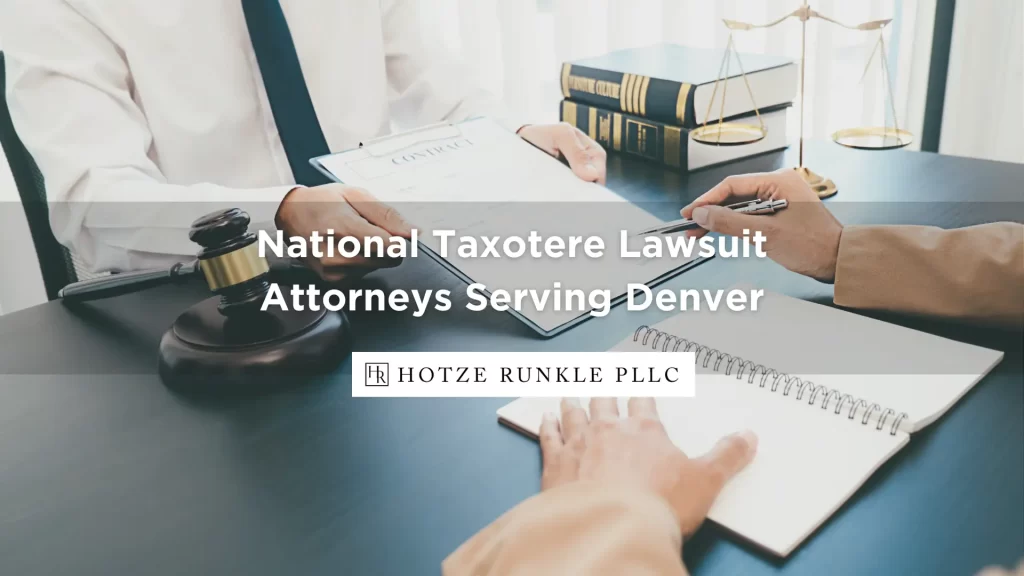
Taxotere is a popular chemotherapy drug used to treat various cancers, including breast cancer, head cancer, neck cancer, lung cancer, and stomach cancer. Unfortunately, it could also lead to a dangerous eye condition called canalicular stenosis. Symptoms include excessive tearing, blurry vision, swollen eyelids, and more. Sanofi-Aventis is the manufacturer that sold this dangerous drug to doctors and patients without warning them of the potential side effects.
Hotze Runkle PLLC might be able to help you if you developed an adverse reaction to your Taxotere chemo treatment. Canalicular stenosis is a permanent condition with no known cure, and treatment may involve an invasive surgery. The side effects of canalicular stenosis could affect your daily routine and reduce your quality of life.
We’ll help you fight for the justice you deserve and hold Sanofi-Aventis liable for their careless actions. You won’t have to go through this battle alone. We’ll be by your side every step of the way. Take our quiz to learn about your legal options.
Symptoms Associated With Canalicular Stenosis
Patients typically start experiencing symptoms of canalicular stenosis while they’re still undergoing chemo treatment with Taxotere. The first symptom is usually epiphora, excessive and uncontrollable eye-watering. When structures within the eye function properly, tears travel from the eyes into the nasal cavity through a tube called the canaliculus. If chronic inflammation of the canaliculus occurs, it can block the vital eye structure, preventing tears from funneling through as normal.
Without early medical intervention by an experienced ophthalmologist, your symptoms could worsen. When the canaliculus starts to close, there’s nothing you can do to reverse it. Eventually, your tears won’t be able to funnel into your nasal cavity. Instead, they will build up on the surface of your eye and get released upon blinking.
Once canalicular stenosis develops, you can’t reverse the effects, and it could lead to various symptoms, such as:
- Dry eyes
- Light sensitivity
- Eyelid swelling
- Clouding of the eye lens
- Blurred vision
- Headaches
- Eye infections
- Watery eyes
The severity of the symptoms depends on each individual patient. Some only suffer minor side effects, while others experience severe symptoms that impact their daily life. For some, it interferes with their ability to work, drive, and take care of their family. It can greatly reduce someone’s quality of life and prevent them from participating in activities they once enjoyed.
The Interaction Between Taxotere and Tears
Taxotere gets administered during chemotherapy once a week, every two weeks, or every three weeks. It works by attacking cancer cells and shrinking them so they can’t spread throughout the body. Unfortunately, medical researchers found a harmful link between the popular drug and a patient’s tears.
As the drug travels through a person’s body, it interacts with various fluids, including tears. Secretions from Taxotere, then, come in direct contact with the canaliculus. That can lead to inflammation that causes the eye structure to become infected. Chronic inflammation and infection from the drug eventually cause the canaliculus to close.
Without early diagnosis and treatment, the canaliculus becomes severely damaged, and canalicular stenosis develops. The permanent ocular condition’s side effects eventually worsen, and the only potential solution is an invasive and expensive surgery.
How to Treat Canalicular Stenosis
You should notify your oncologist of any unusual eye symptoms you’re experiencing as a result of your chemotherapy and go to an ophthalmologist for an evaluation. In its early stages, you could manage your epiphora symptoms, so the condition doesn’t worsen and interfere with your daily life. You could continue chemo treatment while your doctor monitors your health and tries to prevent your condition from worsening.
Once canalicular stenosis develops, however, you won’t be able to cure it. You could try to manage your symptoms through surgery, but the procedure can be risky. It gets performed on a sensitive area of your eye and could make side effects worse than the symptoms of your medical condition.
Dacryocystorhinostomy (DCR) is a type of surgery that aims to create a new passageway for tears. During the procedure, the surgeon will use adjacent structures to facilitate the flow of tears or place a stent over the damaged canaliculus. The tears will be able to bypass the obstruction and flow into the nasal cavity like they’re supposed to.
Since the ocular cavity contains sensitive tissue, bone, and other structures, some risks come with undergoing this invasive surgery. They include:
- Blindness
- Tissue damage
- Significant scarring
- A displaced or ineffective stent
- Uncontrollable bleeding
- Eye infections
- Sinusitis
If the damage to your canaliculi is too severe to qualify for the DCR surgery, your doctor might recommend CDCR. Conjunctivodacryocystorhinostomy involves the placement of a small glass tube called a Jones tube. It gets positioned over the damaged canaliculus so tears can funnel from the tear ducts into the nasal cavity. It’s a procedure that’s only available in extreme cases where DCR likely won’t fix the problem. However, it’s just as risky and could lead to the same side effects.
Holding the Pharmaceutical Company Liable
No one was aware of the potential risks they faced from undergoing Taxotere chemo. Sanofi-Aventis failed to warn users and doctors of the side effects their drug could cause. All pharmaceutical companies hold a responsibility to notify the U.S. Food and Drug Administration of any adverse reactions. They must also provide adequate warning labels so users of the drug know about the symptoms they could experience.
Sanofi-Aventis’ actions are a clear form of negligence. Negligence is the legal theory that one party’s failure to provide a reasonable degree of care resulted in another party’s injury. There are five elements you must prove if you want to use negligence as the basis of your lawsuit:
- Duty: Sanofi-Aventis owed you a duty of care to prevent you from injury;
- Breach of duty: They breached their duty;
- Cause in fact: If it wasn’t for their actions, you wouldn’t have suffered harm;
- Proximate cause: Their breach was the direct cause of your injury; and
- Damages: You incurred damages as a result.
Suing a pharmaceutical company might seem like an enormous undertaking. It’s a complex and overwhelming legal process for anyone to handle. Large drug companies often hire intimidating legal teams to fight against others in court.
Our Denver Taxotere canalicular stenosis lawsuit lawyers will take care of everything for you so you can focus on recovering. We’ll prepare your lawsuit, collect evidence, and create a solid case that proves Sanofi-Aventis is responsible for your suffering.
The Damages You Could Seek in a Lawsuit
Damages fall under two main categories: economic and non-economic. Economic damages are the expenses associated with an injury, while non-economic damages are intangible losses, such as physical pain and suffering. If you decide to pursue a lawsuit against Sanofi-Aventis, you could potentially recover compensation for the following damages:
- Medical treatment
- Pain and suffering
- Emotional trauma
- Lost wages
- Out-of-pocket costs
- Inconvenience
- Physical impairment or disfigurement
Since non-economic damages are difficult to monetize, a jury will review the following factors to determine a fair financial award:
- Type and severity of the injury caused by Taxotere
- Length of time to recover
- If a permanent medical condition resulted from the chemo treatment
- Availability of relevant evidence proving Sanofi-Aventis’ negligence
- Impact of the injury on daily life
- Total economic damages associated with Taxotere side effects
- Type of medical treatment required
- Total hours and income missed due to inability to work
Your lawyer will perform a thorough investigation and collect crucial evidence. We’ll ensure we build a solid case and create a strategy that shows you developed adverse symptoms because of your Taxotere treatment.
We have experience fighting large drug companies aggressively in court to protect our clients’ rights and seek the justice they deserve. We believe in recovering the maximum financial award necessary, so injured victims can afford their past and future damages. You shouldn’t have to pay out of pocket because of someone else’s negligence.
What Should I Do If I Can’t Afford a Lawyer?
 Many people decide to pursue legal action without the help of a lawyer. They think in the long run, they’ll save money. Unfortunately, most people don’t understand the legal process they must follow. They end up losing their case or making an error that leads to much lower compensation than they deserve.
Many people decide to pursue legal action without the help of a lawyer. They think in the long run, they’ll save money. Unfortunately, most people don’t understand the legal process they must follow. They end up losing their case or making an error that leads to much lower compensation than they deserve.
You might think a lawyer is expensive, and you can’t afford it, but at Hotze Runkle PLLC, we work on a contingency-fee-basis. That means there are no upfront fees or costs to receive legal representation. When you hire us, one of our Denver Taxotere canalicular stenosis lawsuit lawyers will take your case without collecting any initial legal fees. We don’t expect payment unless we’re able to recover a monetary award. If we lose your case, you won’t have to pay us.
Speak With a Dedicated Lawyer Today
We know how devastating it is to trust a company’s product and suffer harm from it. You thought Taxotere was a safe option to treat your cancer. Instead, it caused a range of symptoms and led to a permanent medical condition. Sanofi-Aventis’ negligence shouldn’t go unpunished. You have the right to sue them and pursue the maximum compensation available to cover your damages.
Hotze Runkle PLLC will help you fight for the justice you deserve. If you’re experiencing unusual symptoms from Taxotere chemo, find out if you’re eligible for a lawsuit by taking our quiz.